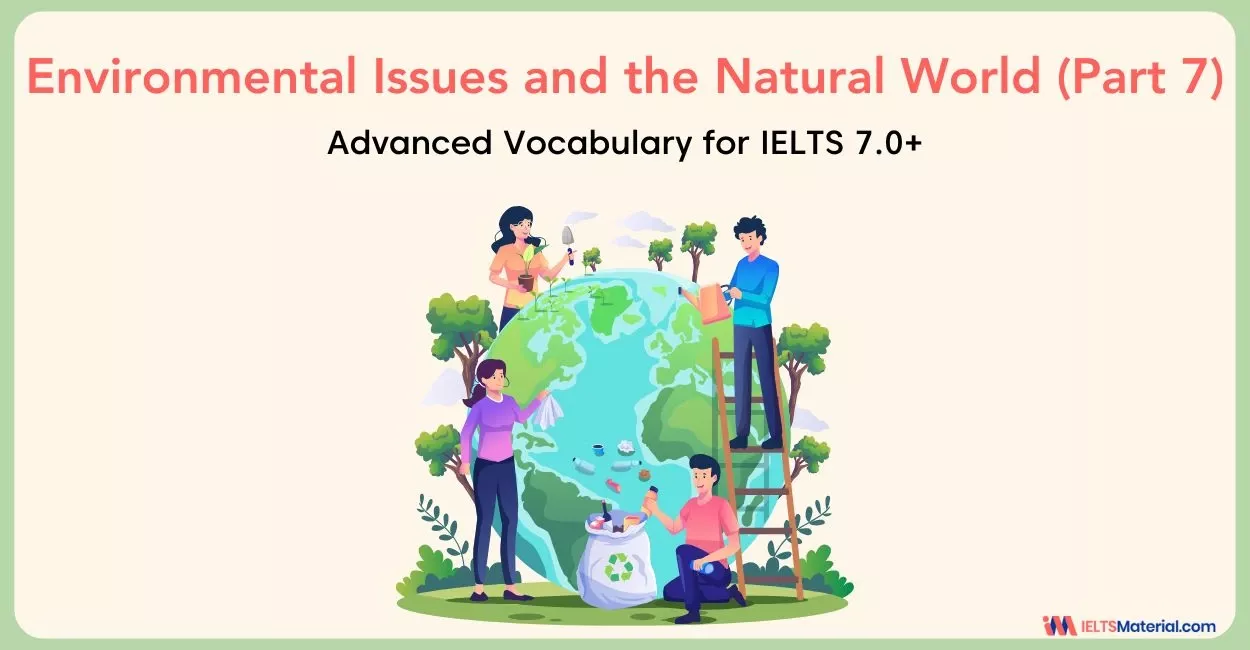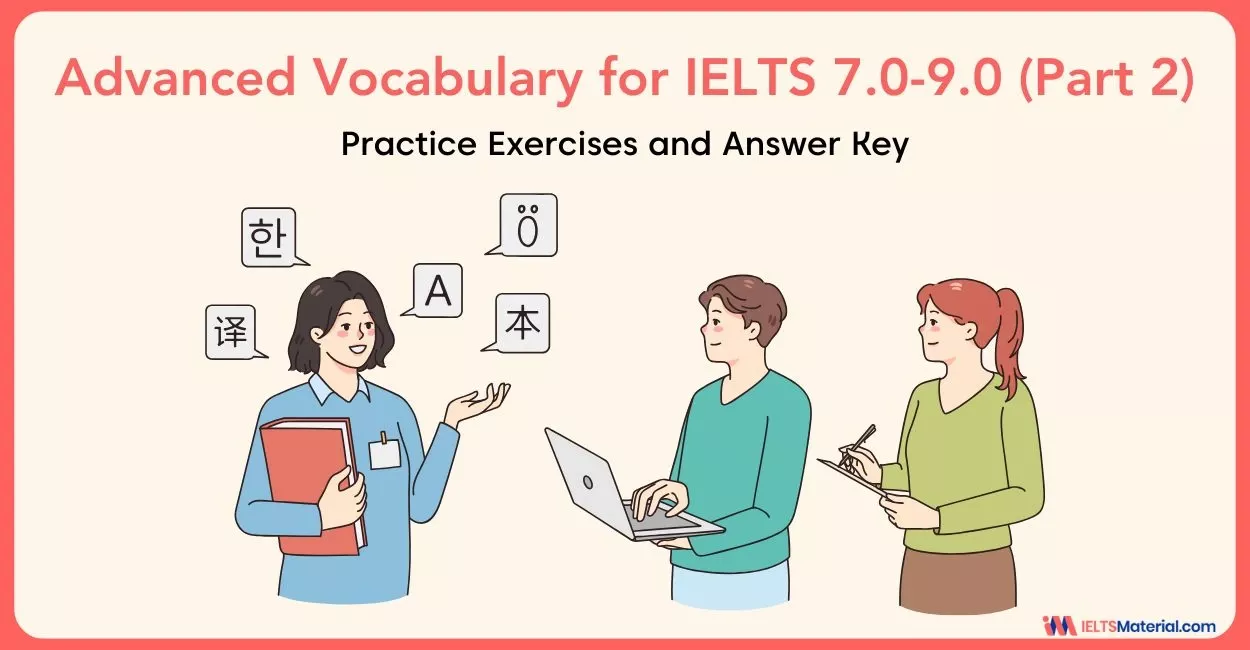Advanced Vocabulary for IELTS 7.0+: Environmental Issues and the Natural World (Part 7)
6 min read
Updated On
-
Copy link
Enhance your band score with this comprehensive guide to environmental issues and natural world vocabulary for IELTS 7.0+. Learn words, definitions & sentence examples related to environment, ideal for the writing, reading, and speaking modules.
Table of Contents
- Environment Vocabulary Related to Potential Consequences of Global Warming
- Environment Vocabulary Related to ‘Doing Our Bit for the Environment’
- Exercises Based on Advanced Environmental Issues and the Natural World Vocabulary for IELTS 7.0 +
- Answer Key for Exercises Based on Advanced Environment Vocabulary for IELTS 7.0 +
- Additional Resources for Improving Your Environment Vocabulary for IELTS

Limited-Time Offer : Access a FREE 10-Day IELTS Study Plan!
Environmental issues and the natural world are among the most frequently discussed topics in IELTS Writing Task 2, Reading, and Speaking. Whether you are asked to talk about climate change, pollution, conservation, renewable energy, or biodiversity, using advanced and precise IELTS vocabulary can instantly lift your band score from 6.0 to 7.0+.
This blog explores essential environment-related vocabulary grouped into two main areas: the potential consequences of global warming and actions and initiatives to protect the natural world. Each table provides meanings and example sentences that demonstrate correct usage.
Environment Vocabulary Related to Potential Consequences of Global Warming
This table covers an advanced vocabulary word list for IELTS linked to the negative impacts of global warming, often seen in IELTS Reading passages and academic discussions.
|
Word |
Meaning |
Example Sentence |
|---|---|---|
|
Inhospitable |
harsh and difficult to live in |
Rising desertification is making once fertile areas increasingly inhospitable. |
|
Vulnerable |
exposed to the possibility of harm |
Low-lying islands are particularly vulnerable to rising sea levels. |
|
Refugees (climate refugees) |
people forced to leave their homes due to environmental changes |
Millions could become climate refugees if coastal regions are submerged. |
|
Displacement |
the forced movement of people from their homes |
Floods caused mass displacement in South Asia last year. |
|
Inundated |
flooded or overwhelmed with water |
Entire villages were inundated after the river burst its banks. |
|
Cover (ice cover/forest cover) |
the extent of land area occupied by natural elements like ice or trees |
The Arctic’s ice cover has declined drastically over the last two decades. |
|
Deglaciation |
the melting and retreat of glaciers |
Deglaciation in the Himalayas threatens water supplies for millions. |
|
Migration |
seasonal or long-term movement of species or people |
Bird migration patterns are shifting due to temperature fluctuations. |
|
Frequency |
the rate at which something occurs |
The frequency of extreme weather events has risen sharply. |
|
Diversity (biodiversity) |
the variety of life in a particular ecosystem |
Coral reef diversity is under threat from ocean acidification. |
|
Extent |
the size or degree of something |
The full extent of polar ice loss is still being studied. |
|
Erosion |
gradual destruction of land, soil, or rock by natural forces |
Coastal erosion is accelerated by stronger storms and rising seas. |
|
Retreat (of glaciers) |
withdrawal or backward movement |
The retreat of glaciers has left rivers with reduced water flow. |
|
Decimate |
to severely reduce in number or strength |
Rising sea temperatures could decimate marine populations. |
Environment Vocabulary Related to ‘Doing Our Bit for the Environment’
This table introduces verbs often used in IELTS Writing Task 2 essays when suggesting solutions for environmental issues.
|
Word |
Meaning |
Example Sentence |
|---|---|---|
|
Releasing |
to set free into the environment |
Factories should avoid releasing untreated waste into rivers. |
|
Upgrading |
improving to a higher standard |
The government is upgrading old power plants to renewable sources. |
|
Enacting |
making laws officially valid |
Parliament is enacting strict measures to cut carbon emissions. |
|
Separating |
dividing into categories |
Separating household waste makes recycling easier. |
|
Ensuring |
making certain that something happens |
Governments must focus on ensuring access to clean water. |
|
Prosecuting |
taking legal action against wrongdoers |
Companies found guilty of illegal dumping are being prosecuted. |
|
Providing |
giving or supplying |
Providing incentives for green energy use encourages sustainability. |
|
Sponsoring |
supporting financially |
Corporations are sponsoring reforestation projects to offset emissions. |
|
Adhering |
following or sticking to rules |
Nations must start adhering to global climate agreements. |
|
Arranging |
planning or organizing |
Schools are arranging awareness drives on environmental conservation. |
|
Lobbying |
attempting to influence decision-makers |
Activists are lobbying for a ban on single-use plastics. |
|
Forming |
creating or establishing |
Communities are forming eco-groups to monitor local pollution. |
|
Protecting |
keeping safe from harm |
Protecting endangered species requires international cooperation. |
|
Fitting |
installing something |
Homeowners are fitting solar panels to reduce electricity costs. |
|
Investing |
putting money into a project for future benefit |
Investing in renewable energy is crucial for sustainable growth. |
|
Substituting |
replacing one thing with another |
Many countries are substituting coal with natural gas and wind power. |
|
Switching |
changing from one system to another |
Consumers are switching to electric vehicles to cut emissions. |
|
Subsidising |
supporting financially by government funds |
The government is subsidising organic farming methods. |
|
Exploiting |
making use of resources unfairly or unsustainably |
Exploiting rainforests for timber threatens biodiversity. |
Are you looking for expert guidance on vocabulary building for IELTS?
Book an IELTS online class & talk to our experts NOW!
Exercises Based on Advanced Environmental Issues and the Natural World Vocabulary for IELTS 7.0 +
It is not enough to simply learn the meanings of words and some sentences, as this will not lead to an improvement in your IELTS band score. To effectively learn how to use it, try vocabulary exercises, which help your brain retain words.
Here are some environment vocabulary exercises for IELTS to help you improve your word choice and boost your vocabulary.
Exercise A: Use the words from the box to fill in gaps 1 – 8. You will not need to change the form of the words. Use each word once only.
| inhospitable | vulnerable |
| refugees | displacement |
| inundated | cover |
| deglaciation | migration |
| frequency | diversity |
| extent | erosion |
| retreat | decimate |
- Already there is some evidence of the _____________ of certain ice sheets in the Arctic. Scientists say that this could get worse. The majority of mountain glaciers throughout the world in both hemispheres are also presently in _____________ .
- Snow _____________ and sea ice _____________are also expected to decline considerably.
- There is expected to be a higher _____________ of extreme weather such as drought, flooding and the formation of intense storm systems.
- Scientists predict that the _____________ of many ecosystems will be reduced and many species will be made extinct. Certain ecosystems such as tundra, mangroves and coral reefs are thought to be particularly _____________.
- Oceanic acidification is predicted to accelerate considerably and this could _____________ entire populations of certain sea creatures at the base of the food chain that rely on carbonate ions to make structures they need to survive.
- There is likely to be more coastal _____________ and coastal flooding on account of rising sea levels, as well as a reduction in the fresh water supply, which could cause severe water shortages.
- Rising sea levels will also cause certain coastal areas to be _____________ and submerged, resulting in further localised population _____________ .
- Crop yield in certain parts of the world which experience significant localised warming will be adversely affected, which could result in mass _____________ and the creation of so-called climate _____________ . Contrariwise, countries lying in more northerly regions could benefit from better annual yields on account of their climates becoming milder and less _____________.
Exercise B: Select an appropriate verb from the box to fill each gap.
| releasing | upgrading | enacting |
| separating | ensuring | prosecuting |
| providing | sponsoring | adhering |
| arranging | lobbying | forming |
| protecting | ensuring | fitting |
| investing | substituting | switching |
| subsidising | fitting | exploiting |
Individuals:
- ________ elected representatives to get them to pursue an environment-focused agenda
- ________ pressure groups to campaign for the introduction of environmental protection legislation
- ________ our homes are properly insulated and 4. ________ double glazing
- ________ waste into recyclable and non-recyclable items
- ________ to energy-saving light bulbs and 7. ________ household appliances are turned off when not in use
- ________ our cars for bikes or public transport where possible and practical
- ________ to carpool with work colleagues or friends
- ________ solar panels on our roofs
Government:
- ________ the public transport system
- ________ renewable sources of energy such as wind and solar power
- ________ the renewable energy industry to make it more competitive on price
- ________ incentives to customers to switch to alternative energy sources
- ________ areas of natural beauty and special environmental significance
- ________ those involved in illegal dumping
- ________ laws to protect endangered species
- ________ in research into alternative forms of energy
- ________ to the terms of the Kyoto Agreement
- ________ international initiatives to protect the environment
- ________ adequate funding to enable the proper policing of environmental protection laws
Answer Key for Exercises Based on Advanced Environment Vocabulary for IELTS 7.0 +
Exercise A
- deglaciation/retreat
- cover/extent
- frequency
- diversity/vulnerable
- decimate
- erosion
- inundated/displacement
- migration/refugees/inhospitable
Exercise B
- lobbying
- forming
- ensuring
- fitting
- separating
- switching
- ensuring
- substituting
- arranging
- fitting
- upgrading
- exploiting
- subsidising
- providing
- protecting
- prosecuting
- enacting
- investing
- adhering
- sponsoring
- releasing
Explore our Vocabulary for IELTS to boost your IELTS vocabulary!
Additional Resources for Improving Your Environment Vocabulary for IELTS
Here are some additional links to help you learn more environment vocabulary for IELTS:
- Advanced Vocabulary for IELTS 7.0 +: ENVIRONMENTAL ISSUES AND THE NATURAL WORLD (Part 1)
- Advanced Vocabulary for IELTS 7.0 +: ENVIRONMENTAL ISSUES AND THE NATURAL WORLD (Part 2)
- Advanced Vocabulary for IELTS 7.0+:Environmental Issues and The Natural World(Part 3)
- Advanced Environment Vocabulary for IELTS 7.0 +: Environmental Issues and the Natural World (Part 4)
- Advanced Vocabulary for IELTS 7.0 +: Environmental Issues And The Natural World (Part 6)
- Advanced Vocabulary for IELTS 7.0 +: Environmental Issues And The Natural World (Part 8)
To conclude, using precise environment-related vocabulary is critical for scoring Band 7.0+ in IELTS. Just like Writing Task 2 essays on climate change, renewable energy, or pollution often requires advanced words, discussing personal actions, words like ‘substituting’, ‘switching’, and ‘protecting’ sound natural and academic. Similarly, words like ‘erosion’, ‘inundated’, and ‘subsidies’ frequently appear in passages, reports, and lectures. Therefore, with consistent practice, these terms will not only strengthen your lexical resource but also give your responses the academic tone IELTS examiners look for.
Useful Links:

Start Preparing for IELTS: Get Your 10-Day Study Plan Today!
Improve your Vocabulary from our Vocabulary Topics



Recent Articles

Nitika Gupt

Nehasri Ravishenbagam

Nehasri Ravishenbagam






Post your Comments